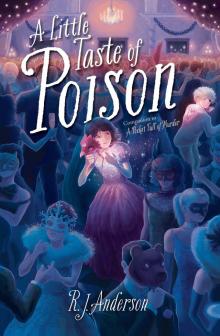- Home
- R. J. Anderson
A Pocket Full of Murder Page 2
A Pocket Full of Murder Read online
Page 2
On Duesday evenings, Papa often went to the Workers’ Club, where they served soup and bread for only ten cits a plate, so that made sense. Yet Anna hadn’t said whether she’d talked to him or not, and it wasn’t like her to be so vague. Did she know something she wasn’t telling? Was it good news or bad?
Normally, it would have been easy to guess, because Annagail was the most transparent person Isaveth knew. But she always looked strained when she came home from the shirt factory, her eyes puffy and her smile thin with weariness. She might be worried about anything—or nothing.
Perhaps she didn’t want to say too much in front of Lilet and Mimmi. Resolving to ask her about it later, Isaveth opened the small hallow cabinet that held their six pairs of blessing candles, a set for each day of the week, and took out the blue ones. Worn and half melted, they still bore traces of the gold coin pattern her mother had painted when she was Annagail’s age, preparing for the household she would bless one day.
“All right,” Isaveth said, setting the candles in their holders and laying the flint-spark beside them. “Everybody wash up and sit down, so Anna can say the blessing.”
* * *
The sun was sinking below the rooftops, and Isaveth was about to call Lilet and Mimmi to bed, when Papa came clumping in the door. His face was flushed, his dark hair slick with sweat, but he was smiling. “There’s my Vettie!” he exclaimed, and Isaveth ran to embrace him.
“Did you find work today?” she asked eagerly. Usually she didn’t dare raise the subject, but a smile was surely a good sign. “Was it a nice meeting?”
Her father’s thick brows shot up. “Who told you about that? I only got the message this afternoon.”
“What message?” Annagail appeared in the kitchen doorway, half-darned stockings in hand. “Oh, Papa, I’m so glad you’re home.” She hurried to drop a kiss on his cheek. “I thought you’d gone to the Workers’ Club.”
So Isaveth had guessed right—her sister had been anxious, even if she hadn’t wanted to say so. But why?
“No, my Anna,” their father said, putting an arm around her shoulders. “I’m not looking for trouble, not with my girls to think about. Is there any supper left for your poor old Papa, or has your boyfriend Merit gobbled it up again?”
Annagail blushed as she always did when Papa teased her, no matter how ridiculous his suggestion might be. Merit was Loyal Kercher’s older brother, and he’d left town three months ago to help build the new railway to Vesperia. “I’ll warm it up for you,” she promised, and hurried to the stove.
Papa had taken his usual seat at the table, and Annagail was scraping the last of the potatoes onto a plate, when Lilet and Mimmi came in. Lilet gave their father a hug, squirmed away from his tickling fingers, and moved on, but Mimmi jumped onto his lap and stole sips of his tea until Isaveth practically had to drag her away. By the time the younger girls were settled and Isaveth returned to the kitchen, her father had cleaned his plate and was filling his pipe with baccy.
“Well, then,” he said as Isaveth and Annagail sat down on either side of him, “as you might have guessed, I’ve got news. Remember that new charmery house Master Orien wanted me to build at the college?”
The girls exchanged startled glances. The charmery was a forbidden subject—had been since before their mother died. That was the project their father had been counting on to save him from ruin, until Orien, the governor of Tarreton College, had canceled the contract with no explanation whatsoever. The shock of it had turned Papa into a different man for a while, short tempered and distant; he’d taken to disappearing at odd times and staying out late, and once he’d come home with bloody knuckles and a great bump on his forehead. It wasn’t until Mama took ill that he’d turned himself about and started acting like their papa again.
“Yes,” said Isaveth cautiously. “What of it?”
“Well, seems the Sagelord took a dislike to the plan and refused to lend any money to it, and that’s why Master Orien had to put a stop to the job. But now Lord Arvis has changed his mind, so it’s going forward after all! The master wants me to hire some lads and get to work straightaway. We’ll be paid fair wages—not much more than that, not with things the way they are—but . . .”
“Oh, Papa!” The shadow fled from Annagail’s face, leaving it radiant. “I’m so happy for you!”
A bubble of joy swelled in Isaveth. If Papa had work again, Annagail could leave her job at the shirt factory and go back to school. They could buy new half soles for their shoes, clothes that actually fit . . . and maybe, just maybe, Isaveth would get an ink bottle and a sheaf of proper writing paper for her birthday.
“That’s wonderful news!” she exclaimed, squeezing Papa’s hand. “So that was the meeting you went to? With Master Orien?”
“That’s right.” He leaned back in his chair and took a long, thoughtful draw on his pipe. “I don’t mind admitting I misjudged the man—he’s a better sort than I took him for. There might be some hope for this city after all.”
Which was high praise, coming from Papa. “So what was all that about the Workers’ Club?” Isaveth asked. “Why was Anna worried you’d gone—”
“Oh, that’s no matter,” Papa interrupted with a warning glance at Annagail. “Nothing you and your sisters need to fret about. I won’t be going back there anytime soon. All right?”
Annagail lowered her eyes, but she looked more relieved than chastened. “Yes, Papa.”
* * *
By the time Isaveth and Annagail went up to bed, the younger girls were asleep. Lilet lay sprawled on her back, dark hair snaking out across the pillow, while Mimmi curled neatly as a mouse against the wall.
“Let’s not wake them,” Annagail whispered. “We can tell them the good news tomorrow.”
Isaveth nodded, and the two of them slipped in next to their sisters—though Isaveth had to shove Lilet over first, since Annagail was too softhearted to do it. For a while they lay quiet, until Isaveth said, “I still want to know why you were worried about Papa going to the Workers’ Club.”
Annagail sighed. “It’s not important now. Can’t you let it go?”
“No,” said Isaveth, propping herself up on one elbow. “I know Papa thinks I’m too young to understand, but I’m not. And I won’t tell Lilet and Mimmi, I promise.”
She waited, letting the silence grow heavy, until Annagail gave in. “I heard two of the overseers at the factory talking about it,” she said. “The City Council’s passed a law making it a crime to speak out publicly against the government, or to organize any protests against them. They’ve ordered landlords to report any political groups that meet in their buildings—”
“The Workers’ Club is political?” Isaveth was startled. She’d thought it only a place where Papa went to have a drink and play a few rounds of Gamble with friends. She knew he sometimes came back from their meetings more agitated than usual, but she’d thought it was only a sign that he felt badly for other people’s troubles. After all, Anna wasn’t the only one in the family with a tender heart.
“Oh, Vettie,” said Annagail, sounding more tired than ever. “Did you really not know? Last month they held a big rally on the steps of Council House calling for the Sagelord to resign, and the Lawkeepers had to break it up. I don’t think Papa was there, but if he was, it wouldn’t be the first time.”
Isaveth stared at the ceiling, trying to digest this new information. She’d heard about the protests that had sprung up in various parts of Tarreton: the Relief Office swarmed by jobless men and women demanding food for their starving families, neighbors stopping a home eviction by blocking the drive and tearing furniture from the movers’ hands, angry dockworkers pelting the Sagelord with fish when he stopped by the harbor to make a speech. Not so long ago Seward Caverly had been arrested while taking part in a supposedly violent demonstration—perhaps even the same rally Anna was talking about.
Yet Isaveth found it hard to imagine her papa doing any such things. He might not go to temple
the way Isaveth and her sisters did, but he was still a Moshite, and he knew how important it was for their people to stay quiet and keep the peace.
“Please don’t say anything to Papa,” Annagail pleaded. “He has work now, and he’s not going to the club anymore. So there’s no need to worry. For any of us.”
The tremor in her voice made her sound less than certain, but Isaveth nodded as though convinced. She turned over and pulled the sheet around her, though her eyes stayed open, and it was a long time before she fell asleep.
* * *
It was the knock at the front door that woke her, an insistent thumping too loud to ignore. Isaveth sat up and looked around in bleary confusion, to find Annagail doing the same. In unison they scrambled out of bed, pulled blankets around their threadbare nightclothes, and hurried downstairs, leaving the sleeping Lilet and Mimmi behind.
“It’s barely dawn,” murmured Annagail. “Who could be calling at this hour?”
Isaveth pushed past her to the door, went up on tiptoe to look through the peephole—and sank back onto her heels, feeling chilled all over. Two Lawkeepers, armed and in full uniform, stood on their front step.
“What? Who is it?” Annagail caught her arm, but a curt voice spoke before Isaveth could reply.
“Urias Breck! Open the door or we’ll break it down!”
“Papa,” gasped Isaveth, clutching her sister in turn. “We have to—”
“All right, I’m coming,” grumbled their father from the steps above, dragging his trouser braces up over his shoulders. “Go back to bed, girls. It’s me they want.”
He sounded resigned, not frightened, so he must have some idea what this was about. Perhaps they only wanted to question him? Isaveth clasped her hands together, willing herself calm. Then she backed up next to Annagail and watched Papa unlock the door.
“Well, then—” he began, but the Keepers didn’t give him a chance to finish. They seized him, wrenched his wrists behind his back, and shoved him toward their waiting spell-wagon.
“Papa!” cried Isaveth, rushing after him. Her head felt dizzy and her stomach cramped with fear, but she grabbed the arm of the nearest Lawkeeper and hung on. “Why are you taking him? He’s done nothing wrong!”
“That’s for the Lord Justice to decide,” snapped the Keeper, shaking her off. “Get back in the house, girl.”
The Lord Justice! Isaveth stumbled back, aghast. In Auradia Champion’s day city justices had ruled on all sorts of legal matters, large and small. But the present ones troubled themselves with only the most serious offenses—crimes that involved large amounts of money, or violence against the government, or . . .
“Out with it, then,” said Papa, twisting to look at the Keepers. His brows were knit fiercely, and his dark eyes blazed. “If I’m being arrested, I’ve a right to know why.”
The younger Lawkeeper barked a laugh, but the older one looked more stern than ever. “Urias Breck,” he said, “you are charged with the murder of Governor Orien, who was found dead of Common Magic last night.”
The blood drained out of Isaveth’s cheeks. Still, that was nothing compared with what the Keeper’s words did to Papa. His face crumpled up small, all the pride squeezed out of it, and his knees sagged until the officers had to drag him upright again.
“You will be held in custody until you can be questioned by the Lawkeeper-General,” continued the older one, hauling Papa toward the back of the wagon. “If you refuse to answer fully, you may be truth-bound—”
Isaveth’s father exploded. With a roar he flung himself against the Keepers’ grip, twisting and lunging in all directions. Anna tugged desperately at Isaveth’s elbow, trying to coax her inside, but Isaveth couldn’t tear herself away.
“Papa, don’t!” she cried. “We’ll be all right! Just go with them!”
Her father gave no sign of hearing. He kept struggling with the Lawkeepers until the younger man wrenched a sleep-wand from his belt and jabbed her father in the neck with it. Then he dropped like a sack of turnips, and the officers heaved him into their wagon and slammed the door.
“Please, Vettie,” whispered Annagail as the Keeper yanked a lever and the spell-wagon juddered to life. “Everyone’s watching. And there’s nothing we can do.”
But Isaveth refused to move, even though she could feel Loyal Kercher’s smirk from across the street. She clutched the blanket about her shoulders and watched, sick with misery, as the Lawkeepers took her father away.
Chapter Three
“HE DIDN’T DO IT. He couldn’t have.”
Isaveth paced around the kitchen table, too restless to eat the porridge Annagail had made for breakfast. Mimmi was eating hers, but slowly and with sniffs between every bite, while Anna kept lifting her spoon, making a face, and putting it down again. Meanwhile, Lilet had pushed away her empty bowl and started on Isaveth’s, though her expression made plain she was only building up her strength so she could fight the Lawkeepers and get Papa back.
“Of course he didn’t,” said Annagail, “but the Lawkeepers don’t know that, and it’s their responsibility to look into these things. We just have to be patient until this is all cleared up.” She retrieved Isaveth’s bowl and put it back in place, then slid her own porridge across the table to Lilet. “Vettie, please sit down and eat something. You’re making me dizzy.”
“I can’t eat any more,” said Mimmi thickly. “My stomach is too full of sad.” She drooped against Annagail’s shoulder. “They won’t arrest us, too, will they?”
“Don’t be stupid, Mimmi,” snapped Lilet. “Why would the Lawkeepers want us? We haven’t done anything.” But she flicked an uncertain look at Isaveth as she spoke. Back when they’d still had a crystal set, Isaveth had listened to all the talkie-plays she could, many of them about Lawkeepers, advocates, and other crime-fighting heroes. She knew more about the justice system than any of them.
“No, they won’t arrest us,” said Isaveth, trying to sound confident. Her insides were seething and she wanted to cry and smash things, but she had to be calm for her sisters’ sake. “They don’t put children in jail—we aren’t even allowed in court. Anna’s the only one old enough, and if the Lawkeepers thought she knew anything, they’d have questioned her already. Or at least told her not to leave the city.”
“Vettie’s right,” said Annagail. “There’s no need to worry. The Lawkeepers arrested Papa by mistake, but they’ll soon let him go, you’ll see. Now both of you get dressed, and I’ll take you to Aunt Sal’s.”
“But we were there yesterday!”
“When Sal hears what happened to Papa, she’ll understand. And Vettie and I have work to do, so you’ll be better off there than here. Just be polite, and—”
“Don’t make any trouble.” Lilet gave a gusty sigh. “I know. Come on, Mimmi.” She held out a hand to their little sister, who took it reluctantly, and the two of them went upstairs together.
As soon as they were gone, Isaveth dropped into a chair and put her head in her hands. “This is horrible,” she whispered. “If Papa goes to prison, what’ll become of us? What are we going to do?”
“Pray,” said Annagail, equally quiet. “I don’t think they’ll separate us, not with me being sixteen and working, and Aunt Sal so close by. But it’s not going to be easy.” She untied the prayer scarf from her neck and veiled herself, then reached for Isaveth’s hand.
“I can’t right now,” said Isaveth hoarsely. “You pray for both of us. I’m going to talk to Morra.” Before her sister could protest, she pushed her chair back and hurried out.
The morning sun glared down on her head and shoulders as Isaveth ran to the Caverlys’ front door. She knocked and waited, hopping restlessly from one foot to the other, but no one answered.
Could they have gone out? Isaveth rapped harder and pressed her ear to the wood. Floorboards creaked inside the house, while above her muffled voices rose and fell. Yet the door remained shut.
“Morra!” she shouted. “I need to talk to you!” A
fter all, Morra’s brother had been arrested not long ago, so she ought to be able to tell Isaveth what to do—or at least what to expect.
A long pause followed. Then the door cracked open, and Morra’s round white face peered out.
“I can’t—” she began, but that was as far as she got before her mother pulled her aside.
“Morra’s got nothing to say to the likes of you. We’re respectable folk, and we don’t want any trouble. Go back to your own people. Don’t come here again.”
She started to shut the door, but Isaveth stepped to block it. “Please, I only wanted to ask—”
“How dare you!” said Missus Caverly, kicking at Isaveth’s foot. “Morra, get your brother!”
Morra’s eyes met Isaveth’s, full of fear and misery. “We can’t help you,” she said. “Please go away.” Then she put her shoulder to the door, and Isaveth jumped back a second before it slammed shut.
Until now Morra Caverly had been Isaveth’s closest friend in the neighborhood—one of the few people she knew who didn’t care that her family was Moshite. She’d thought she could count on the older girl to support her, but it seemed that Morra and her family cared only about protecting themselves.
Shoulders slumping, Isaveth walked down the steps, leaving the Caverlys’ house behind her.
* * *
Isaveth had to do something. She couldn’t bear to lie about, weeping—what good would that be to Papa, or anyone? Yet she was so dazed with the shock of all that had happened, she hardly knew where to turn.
Still, one thing was clear: With Papa gone, the need to make money was more pressing than ever. She had to sell her tablets today, no matter how unhappy she felt. Just as Anna had to go to the factory, or she’d lose her job—and that would be unthinkable.
“I’ll sign out at midday and go to the Keeper Station,” Anna promised, tying her prayer scarf about her neck. “I’ll find out all I can about Papa, and if there’s anything we can do.” She kissed Isaveth’s cheek, whispered, “Be brave,” and hurried out.

 Quicksilver
Quicksilver Knife
Knife Arrow
Arrow Ultraviolet
Ultraviolet Wayfarer
Wayfarer A Little Taste of Poison
A Little Taste of Poison Nomad
Nomad Torch
Torch Rebel fr-2
Rebel fr-2 Swift
Swift Faery Rebels
Faery Rebels Spell Hunter fr-1
Spell Hunter fr-1